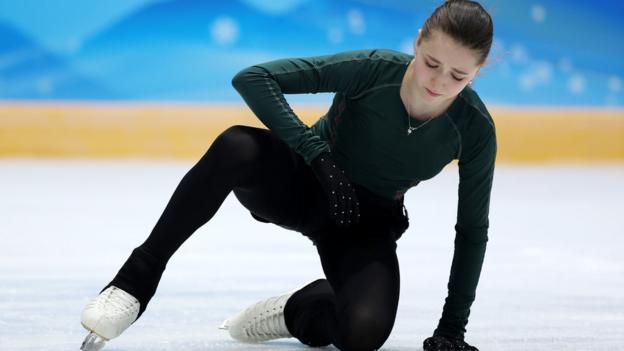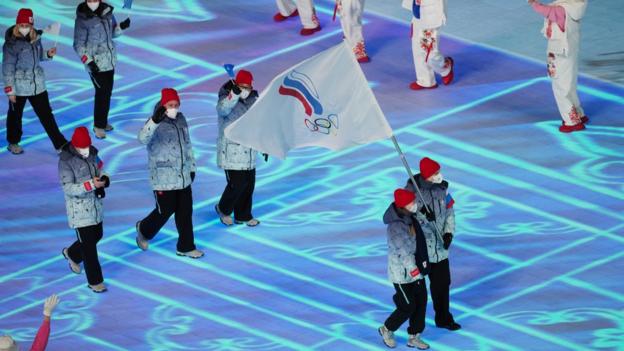Winter Olympics: What were the drug test rules for Winter Olympics? And what did Kamila Valieva do about them?
[ad_1]

Kamila Valieva (15 years old) is allowed to continue skating at the Winter Olympics, despite having failed a drug test.
This has brought to light the issue of athletes using doping to improve their performance.
How did Kamila Vaieva get away with breaking the rules?
Her team, the Russian Olympic Committee won a gold medal thanks to Valieva. With her performance, she was the first woman worldwide to perform a quadruple leap.
The International Testing Agency however reported that she had failed a drug test based on a December sample.
Valieva tested positive for trimetazidine,It is often given to patients with angina, a condition that causes heart problems. Because it is proven to improve the heart’s function, it is banned from athletes.
Because Valieva is over 18, the Court of Arbitration for Sport permitted her to continue competing. She is competing in the single skate competition for a second silver medal.
There are many common callsFor her to hold accountable the doctors, coaches, and officials around her.
What is doping? How is it done?
Some athletes use drugs to enhance their performance. This gives them an unfair advantage over other athletes.
Anabolic steroids, hormones and heart medicines are some of the most commonly used.
Athletes’ blood and urine are tested for performance-enhancing drugs by scientists working for the World Anti-Doping Agency (Wada)
After decades of doping in athletics, Wada would like to see the sport eliminated. Such as the former East Germany. routinely gave their competitors performance-enhancing drugs.
It was threatening to destroy the credibility of the Olympics.
Wada’s command oversees the testing by both national and regional anti-doping authorities. Athletes You can test it any day of the calendar.
What are the penalties for doingping?
An athlete can be disqualified from an event and forced to return their medals. They can be banned from participating in any sport for up to four years.
They could also be fined.
Some have called for the complete ban of Russian athletes from the Olympics. This includes when they are competing on a neutral Olympic Committee team.
Travis Tygart, head of the US Anti-Doping Agency, said the US might try to prosecute those involved in giving Valieva performance-enhancing drugs, using Rodchenkov Act, which was just passed.
It enables courts to fine people – including non-Americans – up to $1m (£740,000), or jail them for up to 10 years if their doping activities affected an American athlete’s results.
What has Russia done to doping laws in the past?
Russia revealed in 2016 that it had a state-sponsored program for doping across the winter and summer Olympic sports.
This included altering tests at the 2014 Sochi Winter Games. Russia hosted these games and was the top medalist.
A Wada investigating commission revealedRusada, the national anti-doping organization, gave athletes advance notice about tests, destroyed thousands upon samples, bullied doping control officials and their families, as well as taking bribes to cover for missing tests.
It was also reported that officers of the Russian security service, FSB, were present in testing labs as part of a larger pattern “direct intimidation” and “interference by the Russian state with Moscow laboratory operations.
Wada stated that many Russian athletes were suspected of doping participated in the London 2012 Olympics.
Russian athletes were therefore banned from the Rio Summer Games track and field events. Wada has banned Russian teams from all major sporting events for 2019.
The ban would last until December of this year. According to one senior member of International Olympic Committee, the ban will remain in effect until December 2012. Russia should “time out”From future Games to the day it has eliminated its doping culture.
Russia’s government denied that it ran a state-sponsored doping program. However, they acknowledged. The country faced a major problemDoping
Why are Russian athletes participating in the Beijing Games?
Russia is currently prohibited from participating in the Winter or Summer Olympics as a country.
Russian athletes are allowed to compete as a neutral team, the Russian Olympic Committee
Competitors need to have proven they are not a part of any doping scandals.

ROC competitors who earn medals will not be able to hear the national anthem or see their flag raised.
2020 Tokyo Summer Olympics Other athletes complainedThe Russians were allowed at all to compete.

Five famous Olympic doping scandals
Sun Yang (China), 2020 Tokyo Games
Sun Yang, a swimmer, was banned from the Games because he refused to give anti-doping officials vials of blood for testing. His entourage Use a hammer to smash the vials. He was prohibited from competing for eighteen years.
Marion Jones (USA), 2000 Sydney Games
Marion Jones won three gold and two bronze medals in Sydney in 2007, but she was not able to win any in 2007. Pled guilty to using illegal steroids. She was sentenced to six months in prison and all five of her medals were taken away.
Tony Andre André Hansen (Norway), 2008 Beijing Games
The show jumper Was stripped of a bronze-medalCamiro, a horse owned by Camiro, tested positive for capsaicin. It is a stimulant that is made from chili peppers.
Ross Rebagliati (Canada), 1998 Nagano Winter Games
His gold medal in the giant slalom was taken from the snowboarder because he Positive for cannabis. He got it back because marijuana wasn’t banned at the Olympics. It is now.
Ben Johnson (Canada), 1988 Seoul Games
Ben Johnson won in record time the 100-metre final, but was stripped his gold medal. Test positive for anabolic steroids.


